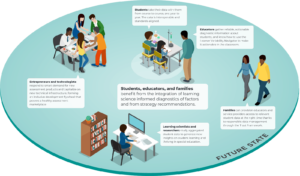Customization is to Fracking as Persistence is to Horizontal Drilling

Maybe you missed it, but Harold Hamm’s discovery may have doubled America’s oil reserves. Read How North Dakota Became Saudi Arabia and you’ll learn about massive Bakken fields in Montana and North Dakota and you’ll see why he’s a happy dude and optimistic about American energy independence.
Innovation changes our assumptions. It makes possible what was previously impossible. It changes the math in our mental models.
The Bakken field has always been there, but it’s really new technology that turned it into a viable resource. The WSJ describes the development of new drilling techniques:
“Horizontal drilling” allows rigs to reach two miles into the ground and then spread horizontally by thousands of feet. Mr. Hamm was one of the pioneers of this method in the 1990s, and it has done for the oil industry what hydraulic fracturing has done for natural gas drilling in places like the Marcellus Shale in the Northeast. Both innovations have unlocked decades worth of new sources of domestic fossil fuels that previously couldn’t be extracted at affordable cost.
Here’s a video on horizontal drilling and hydraulic fracturing if you want to learn more. It’s amazing stuff, but not without controversy. If you search ‘fracking’ you can read up on some of the concerns that people have.
Learning technology is like the Bakken field—a giant untapped resource to dramatically improve productivity. The two breakthroughs most likely to unleash human potential are customization and motivation.
Customized learning—a learning journey unique in rate, time, location, and path—is increasing learning per hour. For example, I got a sneak peak at amazing research results from ST Math. In just two short sessions a week, the visual math games are closing the math achievement gap. Imagine a School of One-like smart algorithm across the curriculum. In a few years these engines will be smart enough to anticipate needs for upcoming field trips or projects—a virtual just-in-time learning assistant for every student.
Motivation sciences will be the big breakthrough of the decade. Variables that produce perseverant behavior will prove to be more important than simplistic views of learning styles or interests. Strategies common in casual games are beginning to build persistence and improve learning. Just introduce a class of fifth graders to Mangahigh (a Learn Capital portfolio company) and watch want happens.
There are a couple foundations that think engaging and personalized learning can not only transform our schools but shift a portion of young people’s out-of-school media consumption to productive learning activity. I’m pretty sure they are right.
When we look at problems, we usually view them through the lens of the past and a mindset of scarcity. Fortunately there are some folks like Harold Hamm willing to take a second look.








Kate
Have you been to someplace where fracking is occurring? I wouldn't say this is the most ... flattering comparison.
John Joseph
Setting aside natural intelligence or interests, my experience has been that learning is a function of engagement, and engagement begins with motivation. As a result, I spend a lot of my time with college students discerning what motivates them...because the more their big-picture goals remain in view, the more willing they are to take the difficult and sometimes less-than-exciting steps required to achieve those goals. One caveat - while I think fun and rewards and recognition are potent motivators for college students, they may even be more important for younger people who may have more difficulty defining long-term goals...unless you believe that our culture promotes a "learning is its own reward" mentality.